高考英语高频语法总结共35页
高考英语语法归纳大全
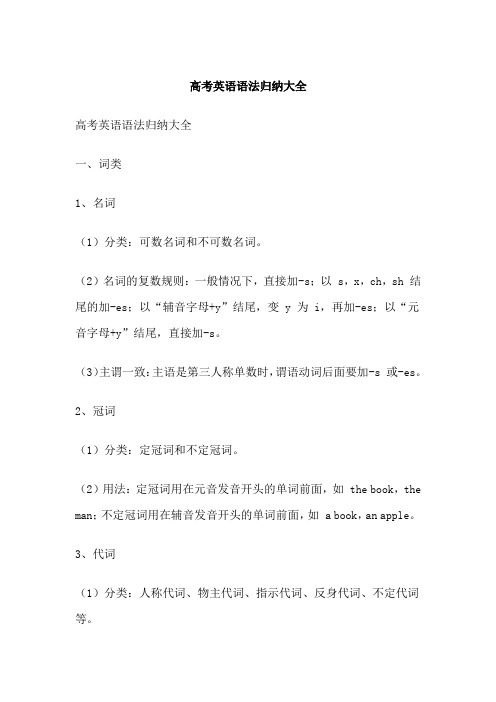
高考英语语法归纳大全高考英语语法归纳大全一、词类1、名词(1)分类:可数名词和不可数名词。
(2)名词的复数规则:一般情况下,直接加-s;以 s,x,ch,sh 结尾的加-es;以“辅音字母+y”结尾,变 y 为 i,再加-es;以“元音字母+y”结尾,直接加-s。
(3)主谓一致:主语是第三人称单数时,谓语动词后面要加-s 或-es。
2、冠词(1)分类:定冠词和不定冠词。
(2)用法:定冠词用在元音发音开头的单词前面,如 the book,the man;不定冠词用在辅音发音开头的单词前面,如 a book,an apple。
3、代词(1)分类:人称代词、物主代词、指示代词、反身代词、不定代词等。
(2)用法:人称代词主格做主语,物主代词却是在名词前面;指示代词 that 这个,those 那个,以及 those on the desk;反身代词表示强调,如 myself,himself 等;不定代词表示泛指,如 something,anyone 等。
4、数词(1)分类:基数词和序数词。
(2)用法:基数词表示数量,如 one,two,three;序数词表示顺序,如 first,second,third。
5、形容词和副词(1)分类:形容词和副词。
(2)用法:形容词修饰名词,如 a beautiful girl;副词修饰动词和形容词,如 run quickly,look carefully。
形容词和副词比较级和最高级的构成:比较级是 more 和 most,最高级是 best 和 most。
6、动词(1)分类:实意动词、连系动词、助动词和情态动词。
(2)用法:实意动词表示动作,有及物动词和不及物动词;连系动词表示状态,常见的有 be,seem,look 等;助动词有 be,have,do 等;情态动词表示情绪和态度,常见的有 can,may,must 等。
7、介词(1)分类:时间介词、方位介词、方式介词等。
高考英语必考语法知识点归纳

高考英语必考语法知识点归纳高考英语必备语法知识整理1高考英语必备语法——常见连接词(1)表选择关系或对等关系的连接词:either…or…,neither…nor…,or,aswellas,and,both…and….(2)表因果关系的连接词:therefore,so,asaresult,astheresultof,becauseof,dueto,owingto,thanksto 等。
(3)表时间顺序的连接词:the moment,as soon as,at first,then,later,mean while,at the beginning,in the end,before long,for the first time,the minute.(4)表转折关系的连接词:yet,and yet,but,while,on the contrary,on the otherhand,however,at the same time等。
(5)表解释说明的连接词:that is,that is to say,in other words,such as,for example,for instance,and soon,etc,and the like,and what not等。
(6)表总结的连接词:in aword,onthe whole,in short,to sumup,in all 等2高考英语必备语法——主语主语:主语是一个句子所叙述的主体,一般位于句首。
在原始的简单句中,主语可由名词、代词、数词、名词化的形容词表示。
例如:During the 1990s, American country music has become more and more popular.(名词)We often speak English in class.(代词)One-third of the students in this class are girls.(数词)The rich should help the poor.(名词化的形容词)3高考英语必备语法——谓语谓语(动词):谓语说明主语所做的动作或具有的特征和状态。
高考英语复习语法填空及改错技巧课件(35张PPT)

both---and---
表转折 but/yet
•表选择or/either---or---/not---but---不是---而是--
•表因果so/for
表对比while
• 一:强调句型It be 被强调部分 that 剩余部分
• 二:非限制性定语从句三特点:1、逗号隔开,
•2、不用that引导,指人用who,指物用which,时间 when,地点where,原因why
固定搭配
•either---or--•neither---nor--•not only---but also--•not—but— •both---and--•one---the other---
•be doing—-when—-正 在做某事突然---
•The reason why(表结 果的句子)—-is that (表原因的句子)—-
•若两个单词、短语或句子(一个主谓关系算一个句 子)之间没有连接词,也没有分号或句号,考虑填 并列连词或从属连词
•判断出缺连词,使用并列连词还是从属连词要看从 句是否缺成分,不缺成分用并列连词,缺成分用从 属连词,缺什么成分补什么成分
•并列连词表递进/顺承and/not only—but also--;
就近一致
•either---or--•neither---nor--•not only---but also--•not—but— •There be—•or
就远一致
•with;together with(连同); along with (和谁一起);as well as(也);like(诸 如);such as(诸如);as much as;no less than(和---一样);rather than(而不 是);including;besides(除---之外)包 括在内;but;except(除---之外)不包括 在内;in addition to(除---之外)
高考英语语法知识点总结-(31118)

高考英语高频考点专题专题一定语从句一、关系代词引导的定语从句1、that 指人或物在从句中作主语,宾语或表语which 指物在从句中作主语,宾语或表语(作宾语时可以省略)who 指人在从句中作主语,宾语或表语whom 指人在从句中作宾语whose 指人或物在从句中作定语as 指人或物在从句中作主语,宾语或表语but 指人或物在从句中作主语,宾语或表语注意:指物时,whose+名词=the+名词+of which 或of which+the+名词2、as 的用法(1)常用于下列结构:such…as; so…as;the same…as; as…as注意:the same…as 表示同一类,不同一个the same…that 表示同一个(2)as与which的区别a、位置不同as可放在主句后,主句前或主句中间;which只能放在主句后。
b、as起连接作用,表达说话人的观点、看法,并指出主句内容的根据或出处,意为“正如,正像”。
Which相当于并列句,可以用and this来代替,意为“这一点,这件事’”。
注意:as常用于下列结构:as we know/ as is known to all, as we all can see, as has been said before/above,as might be excepted, as is often the case, 一般不能用which代替as。
C、在从句中作主语时,which既可作系动词be的主语也可作实义动词的主语,而as只可作系动词be的主语。
3、but用作关系代词,相当于who/that…not例:In China there is no one but knows Lei Feng.二、只用that不用which的情况1、.先行词为all , much, everything, nothing , something ,anything, nothing, none, the one等不定代词时2、先行词被only, any, few, little, no , all, just , very ,right等修饰时.3、当先行词是最高级或被形容词最高级修饰时。
高考英语高频知识点总结

高考英语高频知识点总结高考英语作为中国高中阶段最重要的考试科目之一,备受学生关注。
为了能在考试中取得好成绩,掌握高频知识点是非常关键的。
本文将总结一些高考英语的高频知识点,希望对即将参加高考的同学们有所帮助。
一、语法知识点1. 时态:高考常涉及的时态有一般现在时、一般过去时、现在进行时、过去进行时、现在完成时、过去完成时等。
理解这些时态的用法和区别是解答题目中时态问题的关键。
2. 从句:名词性从句、定语从句和状语从句是高考中的热门考点。
掌握它们的引导词和语序,能够帮助我们正确理解句子的整体意思。
3. 被动语态:被动语态在高考中频繁出现。
我们需要理解被动语态的构成和用法,以便正确转换句子的语态。
4. 单词辨析:高考中常常考察一些近义词、反义词的辨析。
在备考过程中,我们需要仔细研究这些词汇,并进行适当的归纳总结。
二、阅读理解高考英语阅读理解是一个考查考生综合能力的重要环节。
以下是一些值得注意的知识点。
1. 写作手法:作者往往会运用一些手法来增强文章的说服力,例如对比、因果、列举等。
我们需要通过阅读大量的文章来熟悉和理解这些写作手法,并能够准确捕捉文章中的关键信息。
2. 推理判断:在阅读理解题中,我们需要利用已有信息进行推理和判断。
这要求我们有较强的逻辑思维和分析能力。
3. 理解词义:正确理解文章中的词义对于回答问题至关重要。
学会通过上下文推测词义,并能够灵活运用词汇解题。
三、写作技巧高考英语写作要点往往与学生们日常写作中的问题相关。
以下是一些值得注意的技巧。
1. 增加词汇量:丰富的词汇量能够使我们的写作得分更高。
背诵高考常考的词汇和短语,积累一些高级句型和表达方式是必不可少的。
2. 逻辑清晰:写作中,我们要让文章的逻辑结构清晰,条理分明。
通过使用恰当的连接词和过渡词,使文章的段落关系更加紧密。
3. 语法准确:语法错误会导致我们的分数受到严重损失。
在写作过程中,我们需要特别注意一些常见的语法错误,例如主谓一致、时态一致和主语动词一致等。
高考英语语法知识点总结

高考英语语法知识点总结高考英语高频考点专题专题一定语从句一、关系代词引导的定语从句1、that 指人或物在从句中作主语,宾语或表语which 指物在从句中作主语,宾语或表语(作宾语时可以省略)who 指人在从句中作主语,宾语或表语whom 指人在从句中作宾语whose 指人或物在从句中作定语as 指人或物在从句中作主语,宾语或表语but 指人或物在从句中作主语,宾语或表语注意:指物时,whose+名词=the+名词+of which 或of which+the+名词2、as 的用法(1)常用于下列结构:such…as; so…as;the same…as; as…as注意:the same…as 表示同一类,不同一个the same…that 表示同一个(2)as与which的区别a、位置不同as可放在主句后,主句前或主句中间;which只能放在主句后。
b、as起连接作用,表达说话人的观点、看法,并指出主句内容的根据或出处,意为“正如,正像”。
Which相当于并列句,可以用and this来代替,意为“这一点,这件事’”。
注意:as常用于下列结构:as we know/ as is known to all, as we all can see, as has been said before/above,as might be excepted, as is often the case, 一般不能用which代替as。
C、在从句中作主语时,which既可作系动词be的主语也可作实义动词的主语,而as只可作系动词be的主语。
3、but用作关系代词,相当于who/that…not例:In China there is no one but knows Lei Feng.二、只用that不用which的情况1、.先行词为all , much, everything, nothing , something ,anything, nothing, none, the one等不定代词时2、先行词被only, any, few, little, no , all, just , very ,right等修饰时.3、当先行词是最高级或被形容词最高级修饰时。
高考常考英语语法知识点总结归纳

高考常考英语语法知识点总结归纳一、主谓一致主谓一致是英语语法中的基本知识点,常常考察于高考中。
在句子中,主语和谓语动词需要在人称和数上保持一致。
例句:1. My brother is a doctor.(我的兄弟是一名医生。
)2. The students are playing basketball.(学生们正在打篮球。
)二、时态时态是表示动作发生的时间的一种语法形式。
掌握时态的正确用法,能够使句子表达更加准确,避免时态错误。
1. 一般现在时(Simple Present Tense)一般现在时表示经常性或普遍性的动作或状态。
例句:1. They usually go to school by bus.(他们通常乘公共汽车去上学。
)2. Water boils at 100 degrees Celsius.(水在100摄氏度时沸腾。
)2. 现在进行时(Present Continuous Tense)现在进行时表示正在进行的动作。
例句:1. I am studying for the exam.(我正在为考试学习。
)2. She is watching TV right now.(她正在看电视。
)3. 过去时态(Past Tense)过去时态表示过去某个时间发生的动作或存在的状态。
例句:1. We visited the Great Wall last week.(我们上周参观了长城。
)2. He worked in that company for three years.(他在那家公司工作了三年。
)三、从句的引导词从句是一个可以独立存在的句子,它通常包含一个主语和谓语。
从句根据其功能可以分为名词性从句、形容词性从句和副词性从句。
1. 名词性从句名词性从句在句子中充当名词的角色,可以作主语、宾语、表语、同位语等。
例句:1. What he said is true.(他所说的是真的。
)2. I don't know where he is.(我不知道他在哪里。
高考英语高频语法
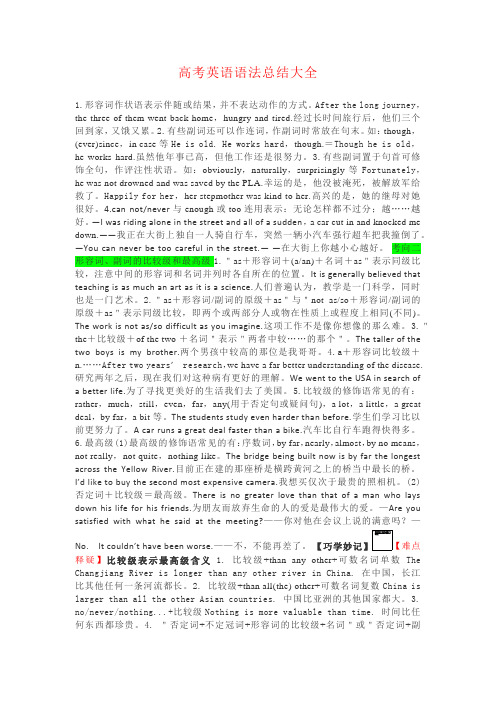
高考英语语法总结大全1.形容词作状语表示伴随或结果,并不表达动作的方式。
After the long journey,the three of them went back home,hungry and tired.经过长时间旅行后,他们三个回到家,又饿又累。
2.有些副词还可以作连词,作副词时常放在句末。
如:though,(ever)since,in case等He is old. He works hard,though.=Though he is old,he works hard.虽然他年事已高,但他工作还是很努力。
3.有些副词置于句首可修饰全句,作评注性状语。
如:obviously,naturally,surprisingly等Fortunately,he was not drowned and was saved by the PLA.幸运的是,他没被淹死,被解放军给救了。
Happily for her,her stepmother was kind to her.高兴的是,她的继母对她很好。
4.can not/never 与enough 或too连用表示:无论怎样都不过分;越……越好。
—I was riding alone in the street and all of a sudden,a car cut in and knocked me down.——我正在大街上独自一人骑自行车,突然一辆小汽车强行超车把我撞倒了。
—You can never be too careful in the street.——在大街上你越小心越好。
考向二形容词、副词的比较级和最高级1."as+形容词+(a/an)+名词+as"表示同级比较,注意中间的形容词和名词并列时各自所在的位置。
It is generally believed that teaching is as much an art as it is a science.人们普遍认为,教学是一门科学,同时也是一门艺术。
高考英语语法总结大全
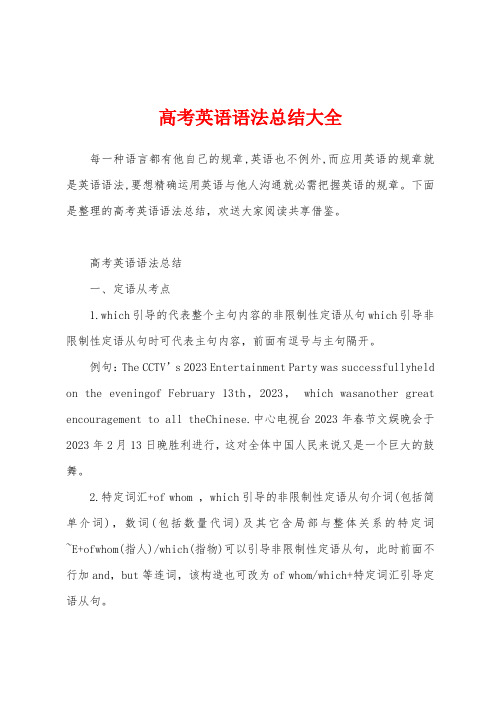
高考英语语法总结大全每一种语言都有他自己的规章,英语也不例外,而应用英语的规章就是英语语法,要想精确运用英语与他人沟通就必需把握英语的规章。
下面是整理的高考英语语法总结,欢送大家阅读共享借鉴。
高考英语语法总结一、定语从考点1.which引导的代表整个主句内容的非限制性定语从句which引导非限制性定语从句时可代表主句内容,前面有逗号与主句隔开。
例句:The CCTV’s 2023 Entertainment Party was successfullyheld on the eveningof February 13th,2023, which wasanother great encouragement to all theChinese.中心电视台2023年春节文娱晚会于2023年2月13日晚胜利进行,这对全体中国人民来说又是一个巨大的鼓舞。
2.特定词汇+of whom ,which引导的非限制性定语从句介词(包括简单介词),数词(包括数量代词)及其它含局部与整体关系的特定词~E+ofwhom(指人)/which(指物)可以引导非限制性定语从句,此时前面不行加and,but等连词,该构造也可改为of whom/which+特定词汇引导定语从句。
例句:Our English teacher has three daughters,all of whom /ofwhom all areconsiderate.我们的英语教师有三个女儿,个个都很善解人意。
3.由when.where引导的先行词隐藏度比拟高的定语从句历年的高考考察实践说明,增加定语从句难度的手段之一是增加先行词的隐藏度,如用point,case,situation等抽象的地点名词做先行词,当其在定语从句中做地点状语时用where引导定语从句的推断难度会增加,用occasion,period等表示抽象时间的名词做先行词,当其在定语从句中做时间状语时用when引导定语从句的判别难度也会增加。
高考详细英语重点语法总结
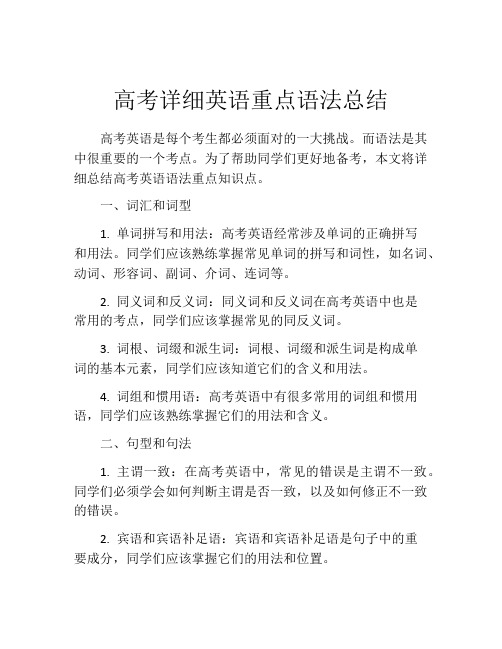
高考详细英语重点语法总结高考英语是每个考生都必须面对的一大挑战。
而语法是其中很重要的一个考点。
为了帮助同学们更好地备考,本文将详细总结高考英语语法重点知识点。
一、词汇和词型1. 单词拼写和用法:高考英语经常涉及单词的正确拼写和用法。
同学们应该熟练掌握常见单词的拼写和词性,如名词、动词、形容词、副词、介词、连词等。
2. 同义词和反义词:同义词和反义词在高考英语中也是常用的考点,同学们应该掌握常见的同反义词。
3. 词根、词缀和派生词:词根、词缀和派生词是构成单词的基本元素,同学们应该知道它们的含义和用法。
4. 词组和惯用语:高考英语中有很多常用的词组和惯用语,同学们应该熟练掌握它们的用法和含义。
二、句型和句法1. 主谓一致:在高考英语中,常见的错误是主谓不一致。
同学们必须学会如何判断主谓是否一致,以及如何修正不一致的错误。
2. 宾语和宾语补足语:宾语和宾语补足语是句子中的重要成分,同学们应该掌握它们的用法和位置。
3. 从句和关系词:从句是复合句中的一个重要部分,关系词是从句中的重要元素。
同学们必须学会如何构造和使用从句和关系词。
4. 并列句和复合句:并列句和复合句是高考英语中常用的句型。
同学们必须学会如何判断和修正错误,并熟练使用这些句型。
三、时态和语态1. 时态和语态的基本概念:在高考英语中,时态和语态是重要的考点。
同学们应该熟练掌握各种时态和语态的基本概念和用法。
2. 时态的转换:同学们还应该掌握时态的转换,如将直接引语改为间接引语时,要将时态与语气作相应调整。
3. 语态的转换:在高考英语中,同学们还必须学会语态的转换,如将主动语态变为被动语态,或将被动语态变为主动语态。
四、虚拟语气和语气1. 虚拟语气的基本概念:虚拟语气是高考英语中难点之一。
同学们必须掌握虚拟语气的基本概念和用法。
2. “should”用法:在虚拟语气中,“should”是重要的标志词之一。
同学们应该熟练掌握它的用法和位置。
3. 语气的变化和转换:语气在高考英语中也是重要的考点。
高考英语语法总结材料

高考英语语法总结材料
一、时态
2、一般过去时:表示过去发生的动作或存在的状态,常与yesterday, last week/month/year, ago等时间状语连用。
3、一般将来时:表示将来发生的动作或存在的状态,常与tomorrow, next week/month/year, soon等时间状语连用。
4、现在进行时:表示正在发生的动作,常与now, at present, at the moment等时间状语连用。
5、现在完成时:表示动作已经完成,常与just, already, yet等副
词连用。
6、现在完成进行时:表示从过去一些时间延续到现在的动作,常与for, since等时间状语连用。
7、将来进行时:表示将来正在进行的动作,常与tomorrow, next week/month/year, soon等时间状语连用。
8、将来完成时:表示将来的一种完成的动作,常与by the end of, by then等时间状语连用。
二、语态
1、被动语态:表示动作的承受者,常与by短语连用。
2、主动语态:表示动作的执行者,常与to短语连用。
三、定语从句
1、一般定语从句:表示合成一句话,常与that, which, who, whom, whose等关系代词连用。
四、名词
1、可数名词:表示可以分开计量的有形的物体或抽象的概念,常与a, an, the, two, three等冠词连用。
2、不可数名词:表示无法计量的无形的状态或抽象的概念,常与some, any, much, little等词连用。
高考复习英语语法总结
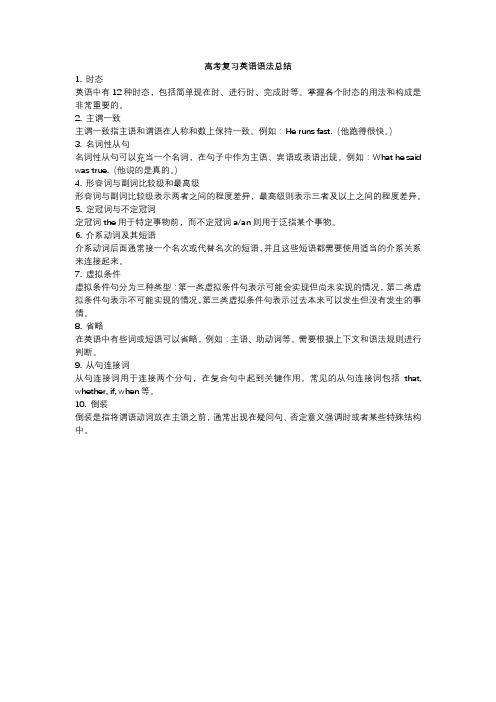
高考复习英语语法总结
1. 时态
英语中有12种时态,包括简单现在时、进行时、完成时等。
掌握各个时态的用法和构成是非常重要的。
2. 主谓一致
主谓一致指主语和谓语在人称和数上保持一致。
例如:He runs fast.(他跑得很快。
)
3. 名词性从句
名词性从句可以充当一个名词,在句子中作为主语、宾语或表语出现。
例如:What he said was true.(他说的是真的。
)
4. 形容词与副词比较级和最高级
形容词与副词比较级表示两者之间的程度差异,最高级则表示三者及以上之间的程度差异。
5. 定冠词与不定冠词
定冠词the用于特定事物前,而不定冠词a/an则用于泛指某个事物。
6. 介系动词及其短语
介系动词后面通常接一个名次或代替名次的短语,并且这些短语都需要使用适当的介系关系来连接起来。
7. 虚拟条件
虚拟条件句分为三种类型:第一类虚拟条件句表示可能会实现但尚未实现的情况,第二类虚拟条件句表示不可能实现的情况,第三类虚拟条件句表示过去本来可以发生但没有发生的事情。
8. 省略
在英语中有些词或短语可以省略,例如:主语、助动词等。
需要根据上下文和语法规则进行判断。
9. 从句连接词
从句连接词用于连接两个分句,在复合句中起到关键作用。
常见的从句连接词包括that, whether, if, when等。
10. 倒装
倒装是指将谓语动词放在主语之前,通常出现在疑问句、否定意义强调时或者某些特殊结构中。
高考英语必背知识点归纳总结
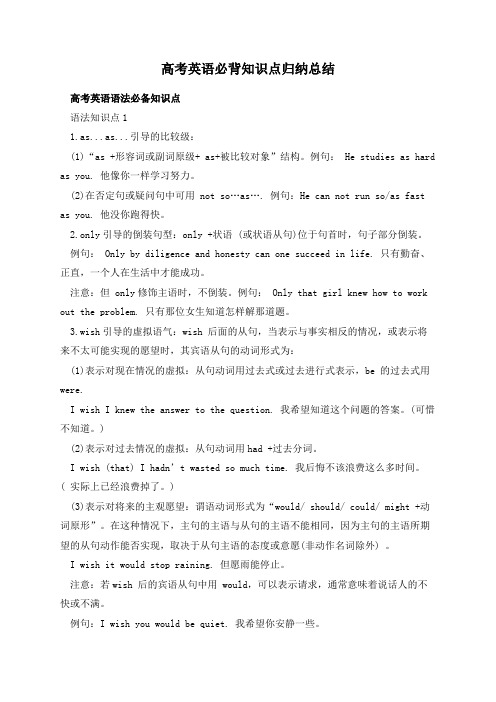
高考英语必背知识点归纳总结高考英语语法必备知识点语法知识点11.as...as...引导的比较级:(1)“as +形容词或副词原级+ as+被比较对象”结构。
例句: He studies as hard as you. 他像你一样学习努力。
(2)在否定句或疑问句中可用not so…as…. 例句:He can not run so/as fast as you. 他没你跑得快。
2.only引导的倒装句型:only +状语 (或状语从句)位于句首时,句子部分倒装。
例句: Only by diligence and honesty can one succeed in life. 只有勤奋、正直,一个人在生活中才能成功。
注意:但 only修饰主语时,不倒装。
例句: Only that girl knew how to work out the problem. 只有那位女生知道怎样解那道题。
3.wish引导的虚拟语气:wish 后面的从句,当表示与事实相反的情况,或表示将来不太可能实现的愿望时,其宾语从句的动词形式为:(1)表示对现在情况的虚拟:从句动词用过去式或过去进行式表示,be 的过去式用were.I wish I knew the answer to the question. 我希望知道这个问题的答案。
(可惜不知道。
)(2)表示对过去情况的虚拟:从句动词用had +过去分词。
I wish (that) I hadn’t wasted so much time. 我后悔不该浪费这么多时间。
( 实际上已经浪费掉了。
)(3)表示对将来的主观愿望:谓语动词形式为“would/ should/ could/ might +动词原形”。
在这种情况下,主句的主语与从句的主语不能相同,因为主句的主语所期望的从句动作能否实现,取决于从句主语的态度或意愿(非动作名词除外) 。
I wish it would stop raining. 但愿雨能停止。
高考英语语法总结大全.pdf
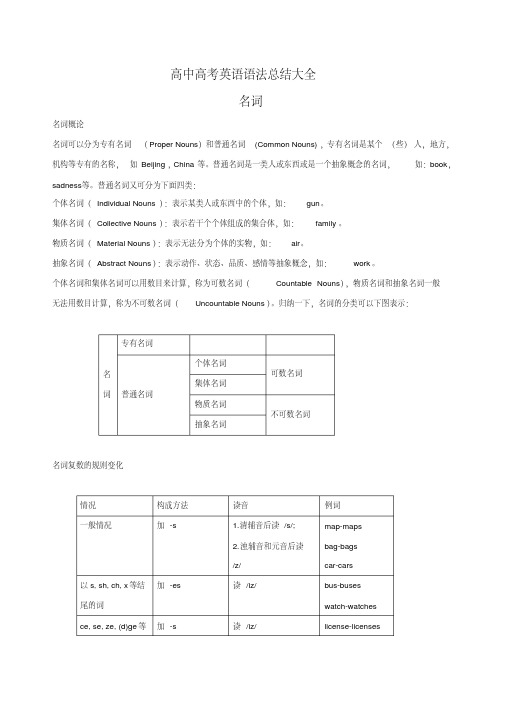
高中高考英语语法总结大全名词名词概论名词可以分为专有名词(Proper Nouns)和普通名词(Common Nouns),专有名词是某个(些)人,地方,机构等专有的名称,如Beijing,China等。
普通名词是一类人或东西或是一个抽象概念的名词,如:book,sadness等。
普通名词又可分为下面四类:个体名词(Individual Nouns):表示某类人或东西中的个体,如:gun。
集体名词(Collective Nouns):表示若干个个体组成的集合体,如:family。
物质名词(Material Nouns):表示无法分为个体的实物,如:air。
抽象名词(Abstract Nouns):表示动作、状态、品质、感情等抽象概念,如:work。
个体名词和集体名词可以用数目来计算,称为可数名词(Countable Nouns),物质名词和抽象名词一般无法用数目计算,称为不可数名词(Uncountable Nouns)。
归纳一下,名词的分类可以下图表示:名词专有名词普通名词个体名词可数名词集体名词物质名词不可数名词抽象名词名词复数的规则变化情况构成方法读音例词一般情况加-s 1.清辅音后读/s/;2.浊辅音和元音后读/z/ map-maps bag-bags car-cars以s, sh, ch, x等结尾的词加-es 读/iz/ bus-buseswatch-watchesce, se, ze, (d)ge等加-s 读/iz/ license-licenses结尾的词以辅音字母+y结变y 为i再加es 读/z/ baby---babies尾的词其它名词复数的规则变化1) 以y结尾的专有名词,或元音字母+y 结尾的名词变复数时,直接加s变复数:如:two Marys the Henrysmonkey---monkeys holiday---holidays比较:层楼:storey ---storeys story---stories2) 以o 结尾的名词,变复数时:a. 加s,如:photo---photos piano---pianosradio---radios zoo---zoos;b. 加es,如:potato—potatoes tomato—tomatoesc. 均可,如:zero---zeros / zeroes3) 以f或fe 结尾的名词变复数时:a. 加s,如:belief---beliefs roof---roofssafe---safes gulf---gulfs;b. 去f, fe 加-ves,如:half---halvesknife---knives leaf---leaves wolf---wolveswife---wives life---lives thief---thieves;c. 均可,如:handkerchief:handkerchiefs / handkerchieves名词复数的不规则变化1)child---children foot---feet tooth---teethmouse---mice man---men woman---women注意:与man 和woman构成的合成词,其复数形式也是-men 和-women。
高考英语语法知识最全概括

5). 以 f 、 fe 结尾的,先把 f 、fe 变 v 再加 es:
leaf----leaves self---selves shelf----shelves life----lives
thief---thieves
2. 少数名词的复数形式是不规则的:
man----men
woman---women child----children
a piece of paper a cup of tea a glass of milk
三、名词的所有格:
1. ’s 所有格:
1). 用 and 连接两个并列的单数名词表示共有关系时,这时只在最后一个名词
后加“’ s. ”:
This is ____________________(Mary and Lily) bedroom.
高考英语语法易考知识点最全概括
第一讲座:名词 --- 基础篇
一、名词的复数:
1. 名词变复数的规则形式:
1). 一般情况下直接加 s: book------books cup-----cups
2). 以辅音字母 +y 结尾的,先变 y 为 i 再加 es :
city-------cities family-----families
tooth----teeth mouse---mice
3. 单数和复数形式相同:
deer---deer fish----fish sheep----sheep Chinese
----Chinese Japanese---Japanese
4. 某国人的复数:
hero-----heroes foot-----feet
hairs “几根白发”; glass “玻璃”, a glass “一只玻璃杯”。
高考英语语法归纳总结

高考英语语法归纳总结目录:第01章名词性从句第02章“It”用法及其句型和固定搭配讲解第03章高中英语语法中的省略现象第04章主谓一致第05章动词不定式第06章倒装结构第07章定语从句第08章被动语态第09章祈使句第10章感叹句第11章疑问句第12章名词第一章名词性从句在句子中起名词作用的句子叫名词性从句〔Noun Clauses〕. 名词性从句的功能相当于名词词组, 它在复合句中能担任主语、宾语、表语、同位语、介词宾语等,因此根据它在句中不同的语法功能,名词从句又可分别称为主语从句、宾语从句、表语从句和同位语从句.一.主语从句主语从句是在复合句中充当主语的从句,通常放在主句谓语动词之前或由形式主语it代替,而本身放在句子末尾.1. It 作形式主语和it引导强调句的比较It 作形式主语代替主语从句,主要是为了平衡句子结构,主语从句的连接词没有变化.而it引导的强调句则是对句子某一部分进行强调,无论强调的是什么成分,都可用连词that.被强调部分指人时也可用who/whom.例如:a〕 It is a pi ty that you didn’t go to see the film. 你不去看那场电影真可惜.b〕 It doesn’t interest me whether you succeed or not.我对你成功与否不感兴趣.c〕 It is in the morning that the murder took place. 谋杀案是在早上发生的.〔强调句型〕d〕 It is John that broke the window. 是John打碎的窗户.〔强调句型〕2. 用it 作形式主语的结构〔1〕 It is +名词+从句It is a fact that …事实是…It is an honor that …非常荣幸…是常识〔2〕 It is +形容词+从句It is natural that…很自然…It is strange that…奇怪的是…〔3〕 It is +不及物动词+从句It seems that…似乎…It happened that…碰巧…It appears that…似乎…〔4〕 It +过去分词+从句It is reported that…据报道…It has been proved that…已证实…It is said that…据说…3. 主语从句不可位于句首的五种情况:〔1〕if 引导的主语从句不可居于复合句句首.〔2〕It is said /reported…结构中的主语从句不可提前.例如:正确表达:It is said that President Jiang will visit our school next week.错误表达:That President Jiang will visit our school next week is said.〔3〕It happens/occurs…结构中的主语从句不可提前.例如:正确表达:It occurred to him that he failed in the examination.错误表达:That he failed in the examination occurred to him.〔4〕It doesn’t matter how/whether …结构中的主语从句不可提前.例如:正确表达:It doesn’t matter whether he is wrong or not.错误表达:Whether he is wrong or not doesn’t matter.〔5〕含主语从句的复合句是疑问句时,主语从句不可提前.例如:正确表达:Is it likely that it will rain in the evening?错误表达:Is that will rain in the evening likely?4. what 与that 在引导主语从句时的区别what 引导主语从句时在句时在从句中充当句子成分,如主语.宾语.表语,而that 则不然.例如: a〕 What you said yesterday is right.b〕 That she is still alive is a consolation二.宾语从句宾语从句就是在复合句中作宾语的名词性从句,通常放在主句谓语动词〔及物动词〕或介词之后.1. 作动词的宾语〔1〕由that引导的宾语从句〔that 通常可以省略〕, 例如:I heard that be joined the army. 我听说他参军了.〔2〕由what, whether 〔if〕引导的宾语从句,例如:a〕 She did not know what had happened. 她不知道发生了什么.b〕 I wonder whether you can change this note for me. 我想知道你是否能帮我改一下笔记.〔3〕动词+间接宾语+宾语从句.例如:She told me that she would accept my invitation.她对我说她会接受我的邀请.2. 作介词的宾语,例如:Our success depends upon how well we can cooperate with one another.我们的成功取决于我们之间的合作.3. 作形容词的宾语,例如:I am afraid 〔that〕 I’ve made a mistake.我恐怕我已经犯了一个错误.注意:that 引导的从句常跟在下列形容词后作宾语:anxious, aware, certain, confident, convinced, determined, glad, proud, surprised, worried, sorry, thankful, ashamed, disappointed, annoyed, pleased, hurt, satisfied, content 等.也可以将此类词后的that 从句的看作原因状语从句.4. it 可以作为形式宾语it 不仅可以作为形式主语,还可以作为形式宾语而真正的宾语that 从句则放在句尾,特别是在带复合宾语的句子中. 例如:We heard it that she would get married next month. 我听说她下个朋就会结婚了.5. 后边不能直接跟that 从句的动词这类动词有allow, refuse, let, like, cause, force, admire, condemn, celebrate, dislike, love, help, take, forgive 等.这类词后可以用不定式或动名词作宾语,但不可以用that引导的宾语从句.如:正确表达:I admire their winning the match.错误表达:I admire that they won the match.6. 不可用that从句作直接宾语的动词有些动词不可用于“动词+间接宾语+that从句“结构中,常见的有envy, order, accuse, refuse, impress, forgive, blame, denounce, advise, congratulate等.例如:正确表达:He impressed the manager as an honest man.错误表达:He impressed the manager that he was an honest man.7. 否定的转移若主句谓语动词为think, consider, suppose, believe, expect, fancy, guess, imagine等,其后的宾语从句若含有否定意义,一般要把否定词转移到主句谓语上,从句谓语用肯定式.例如:I don’t think this dress fits you well. 我认为这件衣服不适合你穿.三. 表语从句表语从句在复合句中作表语的名词性从句,放在系动词之后,一般结构是“主语+连系动词+表语从句”.可以接表语从句的连系动词有be, look, remain, seem等.引导表语从句的that常可省略.另外,常用的还有the reason is that…和It is because 等结构.例如:1〕 The question is whether we can make good preparation in such a short time.2〕 This is why we can’t get the support of the people.3〕 But the fact remains that we are behind the other classes.4〕 The reason he is late for school is that he missed the early bus.四. 同位语从句同位语从句就是在复合句中作名词的同位语的名词性从句.1. 同位语从句的功能同位语从句对于名词进一步解释,说明名词的具体内容,一般由that引导,例如:1〕 The king’s decision that the prisoner would be set free surprised all the people.2〕 The order that all the soldiers should stay still is given by the general.2. 同位语在句子中的位置同位语从句有时可以不紧跟在它所说明的名词后面,而是被别的词隔开.例如:He got the news from Mary that the sports meeting was put off.3. 同位语从句与定语从句的区别〔1〕定语从句中的that既代替先行词,同时以在从句中作某个成分〔主语或宾语〕,而同位语从句中的that是连词,只起连接主句与从句的作用,不充当句中任何成分.〔2〕定语从句是形容词性的,其功能是修饰先行词,对先行词加以限定,描述定的性质或特征;同位语从句是名词性的,其功能是对名词进行补充说明.例如:1〕The news that he told me is that Tom would go abroad next year.〔他告诉我的消息是汤姆明年将出国.〕〔第一个that引导的从句是定语从句,that在从句中作宾语〕2〕The news that Tom would go abroad is told by him.〔汤姆将出国的消息是他讲的.〕〔同位语从句,that在句中不作任何成分〕高一英语名词性从句专项练习1.____he does has nothing to do with me.A. whateverB. No matter whatC. ThatD. If2. The manager came over and asked the customer how____3. Energy is ____makes thing work..A. whatB. somethingC. anythingD. that4. Information has been put forward ____ more middle school graduates will be admitted into universities.A. whileB. thatC. whenD. as5. This is ___the Shenzhou V Spaceship landed.A. thereB. in whichC. whereD. when6. They have no idea at all____.A. where he has goneB. where did he goC. which place has he goneD. where has he gone7. The doctor did a lot to reduce th e patient’s fear ____he would die of the disease.A. thatB. whichC. of whichD. of that8. The order came ___the soldiers ____the small village the next morning.A. that ;had to leaveB. that; should leaveC. /; must leaveD. when; should leave9. ___is no possibility ____Bob can win the first prize in the match.A. There; thatB. It; thatC. there; whetherD. It; whether10. The question came up at the meeting_____ we had enough money for our research.A. thatB. whichC. whetherD. if11. Is _____he said really true?A. thatB. whatC. whyD. whether12.____the meeting should last two days or three days doesn’t matter.A. ThatB. WhetherC. IfD. Where13. It worried her a bit _____her hair was turning gray.A. whileB. ifC. thatD. for14. ???_____more countries can use natural energy in the future remains to be seen.A. WhetherB. ThisC. whoD. If15.____he will go to work in a mountain village surprises all of us.A. WhatB. ThatC. WhetherD. If16. ____you don’t like him is none of my business.A. WhatB. ThatC. WhoD. HowA. What; whatB. That; thatC. what; thatD. That ; what18. ____appeared to me that he enjoyed the food very much.A. WhatB. ItC. All thatD. That19. It is widely ______that smoking can cause cancer.A. believedB. thinkC. sayD. hopedA. WhatB. ThatC. HowD. WhereKeys:1—5 ABABC 6—10 AABAC 11—15 BBCAB 16—20 BCBAA第二章“It”用法及其句型和固定搭配讲解"It" 用法及其句型和固定搭配,是高中英语语法的重点、难点,又是近几年高考的热点,因此应给予充分的重视,现将it用法归纳如下:一、It用作实词表达以下概念:指代前文提到的事物,前文中的this, that;替代前文中的内容;指代一位性别不明的小孩或未知的人;指代未指明但谈话双方都知道的那件事;指代时间、天气、气候、距离等自然现象……二、It用作形式主语替代作主语的从句、动词不定式、动名词,而把真正作主语的从句、动词不定式、动名词置于句尾.It 作形式主语的常见句型:1. 代作主语的动词不定式,其句型为〔1〕 It be adj. 〔for sb.〕 to do sth.此处adj. 通常为描述事件的形容词:easy, difficult, hard, necessary, unnecessary, possible, impossible, likely, unlikely, right, wrong, important, unimportant, legal, illegal, well-mannered, ill-mannered, polite, impolite, clear, obvious, certain, suitable, proper, fit, useful, useless, dangerous…例 It is illegal 〔for a teenager〕 to drive a car without a license.〔2〕 It be adj. of sb. to do sth.此处adj. 通常为描述人的形容词:kind, unkind, nice, rude, cruel, considerate, thoughtful, thoughtless, careful, careless, silly, foolish, stupid, clever, wise, crazy.例 It's kind of you to help me with the problem.〔3〕 It替代作主语的动名词的常见句型It's no good/use doing…It's 〔well〕worth doing…It's 〔well〕worth one's while doing/to do…It's 〔well〕worth while doing/ to do例 It's no use crying over spilt milk.2. It替代作主语的从句常见句型〔1〕 It is + noun +从句例 It is no secret that the president wants to have a second term at office.〔2〕 It is adj. +clauseIt's surprising that… 〔should〕………竟然……It's a pity/shame that…〔should〕………竟然……例It's important that you should apologize to her for your rudeness.〔=It's of much importance that you should apologize to her for your rudeness.〕〔3〕 It verb sb. + clause= It is v-ing + clauseIt+surprise/delight/interest/disappoint/worry/disturb/annoy/amaze/bother/concern/frighten/please/anger sb. that…例 It worried me that she drove so fast.〔= It was worrying that she drove so fast.〕〔4〕 It verb 〔to sb.〕 that…= sb/sth verb to do例 It 〔so〕 happened/chanced that they were out.〔= They happened/chanced to be out.〕〔5〕 It is v-ed that…=sb/sth is to do〔verb=say, report, think, believe, hope, expect, agree, accept, decide, determine, intend, plan, understand, know〕例 It is said that the couple have gotten divorced.〔=The couple are said to have gotten divorced.〕〔6〕 It is v-ed that … 〔should〕…例 It is suggested that they should begin with the third question.三、It作主语的句型1. It takes sb. … to do…〔=sb takes…to do…〕某人用多长时间做某事例 It took the men a week to mend our roof.〔= The men took a week to mend our roof.〕2. It's 〔just〕〔un〕like sb. to do…〔不〕像某人做某事的风格例 It was 〔just〕 like him to think of helping us.3. It's 〔about/high〕 time that… should /v-ed…是该做某事的时候了例 It's〔about/high〕 time that we should take action.4. It's the x-th time 〔that〕 … have v-ed…第几次做某事了例 It's the third time that he has failed the driving test.5. It is/has been… since …continuous v-ed〔延续性动词〕某动作已有多长时间不发生了例 It's 10 years that he lived here6. It was〔not〕… before…过〔不〕了多长时间某动作发生了例 It was not long before they arrived.四、It 作形式宾语用来替代作宾语的从句、动词不定式、动名词,而把真正作宾语的从句、动词不定式、动名词置于句尾.It 作形式宾语的常见句型:1. verb+ it+ adj./noun 〔for/of〕 to do/clause 〔verb=think, believe, suppose, consider, feel, make, keep…〕例 I think it hard for you to do the task on your own./I think it hard that you'll do the task on your own.2. verb+it+adj./noun 〔one's〕 doing 〔adj.=useless/worth/worthwhile〕〔noun=no use/no good/worth one's while/a waste of time/money/energy/words〕〔verb=think, believe, suppose, consider, feel, make, keep…〕例 I'll make it worth your while telling me about his secret.3. verb+it+ important/unimportant/necessary/unnecessary/natural/essential that … 〔should〕…verb+it+of much/great/no/little importance that…〔should〕…〔verb=think, believe, suppose, consider, feel, make, keep…〕例 I think it important that you 〔should〕 attendthe conference.4. verb + it+ as+ noun/adj.+ clause 〔verb=accept, regard, take, see, view〕例 The lecturer takes it as encouraging when so many students attend his lecture.5. v. +it + prep. + that…owe it to sb. that…把…归功于…leave it to sb that…把…留给某人去做take it for granted that …想当然keep it in mind that…例 Don't bother to arrange anything. Just leave it to me to sort out.6. It用在不能直接跟宾语从句的动词后面,尤其是表示好恶的动词后,enjoy, like, love, dislike, resent, hate, don't mind, be fond of, feel like, see to 宾语从句紧跟it之后例 I hate it you can swim so well and I can't.7. It用在不能直接跟宾语从句的介词后面,宾语从句紧跟it之后〔except that例外〕例 I'm for it that you will follow their advice.五、强调句型It is/was+被强调部分+ that〔who〕… 强调句型用来强调谓语动词以外的任何句子成分.当被强调部分是人时也可以用who.在使用强调句型时需注意以下几点:1. 请注意强调句型的特殊疑问句例 When was it that he changed his mind to take part in the activity?2. 在强调原因状语从句时,只能强调由because所引导的从句例3. 在强调not … until结构时必须把not与until一起放到被强调的位置上例 It was not until she took off her dark glasses that I realized she was my brother.4. 注意强调句型与定语从句的区别例 It was at 7 o'clock that he came here yesterday.〔强调句型〕It was 7 o'clock when he came here yesterday.〔定语从句〕六、It 常用的固定搭配1. make it〔1〕.在口语当中相当于succeed,表示:成功、做到、说定、赶上、及时到达例 It's hard to make it to the top in show business.〔2〕.在口语中相当于fix the date for,表示“约定好时间”例—Shall we meet next week?—OK. We just make it next Saturday.2. as it is〔1〕.相当于in fact, in reality表示“事实上,实际情况是……”例 We had planed to finish the task today, but as it is we probably won't finish it until next week.〔2〕.相当于方式状语从句,表示“照原样”例 Leave the table as it is.3. as it were 相当于as one might say, that is to say, 表示“也就是说,可以说,换句话说”例 He is, as it were, a modern Sherlock Holmes.4. if it weren't for…/if it hadn't been for…用来引导虚拟语气,相当于without, or but for, 表示“如果不是……,要不是……”例 If it weren't for Tom, I wouldn't be alive today.5. that's it〔1〕. 相当于That's all. That's so much. 表示“至此为止,没有别的了”例 You can have one more sweet, and that's it.〔2〕. 相当于 That's right.表示“对啦”例— I guess the key to the problem is thechoice “A”—That's it.6. catch it 在口语中,相当于be punished/scolded for doing sth. wrong. 表示“因做错事而挨骂,受责备,受批评,受惩罚”例 We'll really catch it form our teacher if we're late for class again.7. have it〔1〕.相当于say, insist表示“说,主张,表明,硬说”例 Rumour has it that they are getting divorced.〔2〕.相当于get to know something,表示“了解,知道,获悉”例 I had it from John that she was going abroad.8. have what it takes在口语中,相当于be well qualified for, 表示“具有成功的条件”例 You can take it from me that your daughter has what it takes to be a star.9. so it seems / appears.10. Keep at it! 〔Don't give up!〕相当于go on,表示“继续做,不放弃”例 My teacher asked me to keep at it.11. Go it! 〔Go on!〕拼命干, 莽撞12. Now you have done it! 〔You have done sth. wrong.〕13. Now you'll catch it! 〔You'll be punished.〕14. As it happened, …在口语中,相当于it's a pity that…, 表示“真不凑巧,真遗憾”例 As it happened, they were out.15. As it turned out,…在口语中,相当于it was found to be in the end, 表示“最后被证明是”例 As it turned out, his statement was false.16. Such as it is〔they are〕在口语中,相当于although it may not be worth much, 表示“虽然没有多大价值”例 You can borrow my exam notebook, such as it is.17. Take it/things easy. 相当于Don't worry or don't hurry. 用来劝告别人,表示“不要慌,别担心,存住气”例 Take it easy! He will do it well.18. Take it from me.在口语中,相当于believe me what I say.表示“请相信我的话,我敢担保”例 You can take it from me that he will make it this time.19. For what it is worth…在口语中,相当于although I'm not sure it's of value, 表示“不管其价值如何”例 Here is the article I promise you, for what it's worth.20. Worth it 在口语中,相当于useful, 表示“有好处,值得做”例 Don't hesitate about it! It's worth it.21. Believe it or not.表示“信不信由你”例 Believe it or not, Tom is getting married to Mary next Sunday.22. Take it or leave it. v. 要么接受要么放弃例 That is my last offer. You can take it or leave it.23. It all depends/that all depends 在口语中,相当于it hasn't been decided yet, 表示“那得看情况,还没有定下来”例—Are you going to the countryside for holiday?—It/That all depends.24. It's up to sb. 在口语中,相当于it's decided by sb. 表示“由……决定,由……负责,取决于……”例—Shall we go out for dinner?—It's up to you.“It”用法及其句型和固定搭配专练1. Was it during the Second World War_____ he died?A.thatB.whileC.in whichD.then 〔88〕A.thisB.thatC.itD.he 〔89〕3. I don't think ____ possible to master a foreign language without much memory work.A.thisB.thatC.itsD.it 〔91〕4.Does ______ matter if he can't finish the job on time?A.thisB.thatC.heD.it 〔91〕5. It was not _____ she took off her glasses _____ I realized she was a famous film star.A.when , thatB.until , thatC.until , thatD.when , then 〔92〕6. I was disappointed with the film. I had expected ______ to be much better.A.thatB.thisC.oneD.it 〔93〕7. It was not until 1920 ______ regular radio broadcasts began.A.whileB.whichC.thatD.since 〔94〕8. ______is a fact that English is being accepted as an international language.A.ThereB.ThisC.ThatD.It 〔95〕9. It was only when I reread this poems recently _____ I began to appreciate their beauty.A.untilB.thatC.thenD.so 〔97〕10. I hate_____when people talk with their mouths full.A.itB.thatC.theseD.them 〔98〕A.oneB.thatC.whatD.it 〔2000〕12.I like ___ in the autumn when the weather is clear and bright. 〔2004〕A. thisB. thatC. itD. one13. —Do you like ___ here?—Oh, yes. The air, the weather, the way of life. Everything is so nice.〔全国卷〕A. thisB. TheseC. ThatD. it14. We needed a new cupboard for the kitchen. So Peter made ___ from some wood. 〔全国卷〕A. itB. OneC. HimselfD. another15. The foreign Minister said, " _____ our hope that the two sides will work towards peace."〔2004北京〕A. This isB. There isC. That isD. It is16. _____ is reported in the newspaper, talks between the two countries are making progress. 〔2004北京〕A. ItB. AsC. ThatD. What17. — How often do you eat out?〔2004, 天津〕— ________, but usually once a week.A. Have no ideaB. It dependsC. As usualD. Generally speaking18. We wanted to get home before dark, but it didn't quite _____ as planed. 〔2004浙江卷〕19. — What do you want to do next? We have half an hour until the basketball game.—________. Whatever you want to do is fine with me.A. It just dependsB. It's up to youC. All rightD. Glad to hear that20. It was ____ back home after the experiment.A. not until midnight did he goB. until midnight that he didn't goC. not until midnight that he wentD. until midnight when he didn't goKEYS:1-5 ACDDB 6-10 DCDBA 11-15 ACDBD 16-20 BBBBC第三章高中英语语法中的省略现象在英语语言中,为了使语言简洁明了,重点突出或上下文紧密相连,可以省去某些句子成分而保持句子愿意不变,这种语言现象称之为省略.现就英语中的种种省略现象分析如下:一、并列复合句中的省略在并列句中后边的分句可以省略与前边分句中相同的成分.如:a〕The boy picked up a coin in the road and 〔the boy 〕handed it to a policeman. 这个男孩在马路上拾起一枚硬币并把他交给了警察.b〕 Your advice made me happy but〔your advice made〕 Tom angry .你的建议使我高兴但使汤姆生气.c〕Tom must have been playing basketball and Mary 〔must have been〕doing her homework. 汤姆肯定一直在打篮球,玛丽一直在写作业.d〕Gao Xiumin was born in 1959 and Fu Biao 〔was born〕in 1963.高秀敏出生于1959年,傅彪出生于1963年.二、主从复合句中的省略1.状语从句中的省略一般说来省略现象多出现在下列五种状语从句中:由 when ,while ,as ,before, after , till, until, once等引导的时间状语从句;由whether ,if , unless 等引导的条件状语从句;由though , although ,even if ,whatever等引导的让步状语从句;由 as ,than 等引导的比较状语从句;由as, as if , as though 等引导的方式状语从句.上述状语从句在省略时应遵循下面原则:1〕当状语从句的主语与主句的主语一致时,可以省略状语从句的主语和系动词be,这时从句中可出现如下结构:〔1〕连词〔as, as if , once〕+ 名词; 〔2〕连词〔though, whether , when〕+形容词;〔3〕连词〔whether, as if ,while 〕+介词短语;〔4〕连词〔when , while , though 〕+ 现在分词;〔5〕连词〔when ,if ,even if ,unless ,once ,until, than , as 〕+ 过去分词;〔6〕连词〔as if ,as though 〕+ 不定式.如:.庞龙曾经是个工人,现在变成一位著名的歌手.b〕 Work hard when 〔you are〕 young ,or you'll regret.趁年轻要努力学习,要不然你会后悔的.c〕 He looked everywhere as if 〔he was〕in search of something .他到处看似乎在找什么东西.d〕 While 〔he was〕 holding talks with President Hu Jintao ,US President George W. Bush thanked China for itsimportant role in the Six-Party Talks.美国总统布什在与胡锦涛主席会谈时,感谢中国在六方会谈中起的重要作用.e〕 The exhibition is more interesting than 〔it was〕 expected .这次展览比被预料的有趣的多.f〕Olympic gold medallist hurdler Liu Xiang opened his lips as if 〔he were〕to speak.奥林匹克金牌获得者跨栏运动员刘翔张开嘴好像要说什么.注意:1〕当从句的主语和主句的宾语一致时,间或也有这样的省略,如:Her father told her to be careful when 〔she was〕crossing the street.当她过马路时父亲告诉她要当心.2〕当从句的主语是 it,谓语动词中又含有系动词be 时,可以把it和系动词be一起省略.此时构成连词〔if , unless ,when , whenever〕+形容词的结构.如:Unless 〔it is〕 necessary ,you'd better not refer to the dictionary.如果没有必要,你最好不要查字典.2.定语从句中的省略1〕一般说来,在限制性定语从句中,作宾语的关系代词 that ,which , whom 可以省略;如:Is this reason 〔that〕he explained at the meeting for his carelessness in his work?这就是他在会上解释他工作中粗心的原因吗?〔2002上海春季〕而在非限制性定语从句中作宾语的关系代词 which , whom 不可以省略.试比较:Tom 〔whom〕 you saw yesterday fell ill.〔 whom可以省〕你昨天见到的汤姆病倒了.Tom , whom you saw yesterday ,fell ill. 〔 whom不可以省〕汤姆病倒了,你昨天见到他了.2〕在口语和非正式用语中,关系副词when ,where , 和 why 经常用that 来代替,甚至还可省略.如:a〕 This is the first time 〔when/that〕he had trouble with the boss.这是他第一次麻烦老板.b〕He wants to find a good place 〔where/that〕we can have a picnic during the “golden week ”holiday .他想找一个能在黄金周期间野餐的好地方.c〕 Could you tell us the reason 〔why/that〕he was so unhappy ? 你能告诉我们他为什么如此不高兴吗?3〕当先行词为表示方式的the way 时,从句不能用how 来引导,应该用that 或in which ,或将它们全部省略.如:I don't like the way 〔that/in which〕 you laugh at her.我不喜欢你嘲笑他的行为.3.宾语从句中的省略1〕在及物动词后面所接的宾语从句中,连词that一般可以省略;但如果及物动词后面是由that引导的两个或两个以上的并列的宾语从句,那么只有第一个t hat可以省略.如:a〕I think 〔that〕the reform of the renminbi's exchange rate is necessary.我认为人民币兑换率的改革是必要的.b〕He said 〔that〕the Anti-secession law had been passed and that President Hu Jintao had signed a presidential order 他说《反分裂国家法》已被通过,而且胡锦涛主席已签署了主席令.2〕由 which , when ,where , how,和 why 引导的宾语从句,可以全部或部分省略.如:n’.我知道NBA明星要到我们城市来但我不知道他什么时候来.b〕He wants to move abroad but his parents wonders why 〔he wants to move abroad〕他想搬迁到国外但他的父母想知道为什么.4.在与suggest ,request ,order ,advise 等词相关的名词性从句中,须用虚拟语气形式“should +动词原形”,should可以省略.如:Chirac, President of the Republic of France suggested that the China-France Culture Year 〔should〕 last long in various forms.法国总统希拉克建议中法文化年以各种各样的形式长期持续.5.主句省略多用于句首.如:〔It is a 〕 Pity that I didn’t go to Mary's birthday party yesterday.很遗憾,我昨天没有去参加玛丽的生日聚会.6.在答语中,主句可全部省略.如:—Why were you absent from school last Friday ?—〔I was absent from school〕Because my mother was ill. —上周五你为什么没有上学?—因为我妈妈病了.三、简单句中的省略1.省略主语1〕祈使句中的主语通常被省略如:〔You〕 Open the door, please. 请开一下门.2〕其它省略主语多限于现成的说法如:a〕〔I〕 Thank you for your help 谢谢你的帮助.b〕〔It〕Doesn’t matter.没关系.2.省略主谓语或主谓语的一部分如:a〕〔There is〕 No smoking. 禁止抽烟b〕〔Is there〕anything else ? 还有其他事吗?.请这边走.d〕〔Will you〕 Have a smoke ? 抽烟吗?3.省略宾语如:—Do you know Mr. Li ? 你认识李先生吗?—I don’t kn ow 〔him.〕我不认识他4.省略表语如:—Are you thirsty ? 你30岁了吗?Yes , I am 〔thirsty〕. 是的,我是.5.同时省略几个成分如:a〕—Are you feeling better now? 你觉得好些了吗?—〔I am feeling 〕 Much better 〔now〕好多了.b〕〔I wish〕 Good luck 〔to you〕 .祝你好运/祝你顺利.四、动词不定式省略,只保留to 的场合1.不定式作某些动词的宾语时,这些动词常见的有:love, like, care, wish, hope, expect, prefer, refuse, mean , try , oblige , advise , persuade , agree , want , afford , forget , remember , try , manage等.如:a〕— You should have thanked her before you left . —I meant to ,but when I was leavin g I couldn’t find her anywhere.—你本该在离开前谢谢她.—我本打算这么做,但当我就要离开的时候我却找不到她了.〔2000上海春〕b〕 You can do it this way if you like to .如果你想做,你可以这么做.2.不定式作某些动词的宾语补足语或主语补足语时,这些动词常见的有:ask , tell ,advise, force, persuade, wish, allow, permit , forbid ,expect, order ,warn 等.如:a〕The boy wanted to ride his bicycle in the street ,but his mother told him not to. 男孩想在街上骑他的自行车,但他母亲不让.〔NMET1995〕n’.她想来,可是她父母不让.3.不定式在句中作某些形容词的状语时,常见的形容词有:happy, glad ,eager , anxious , willing , ready 等.如:— I will be away on a business trip .Could you mind looking after my cat ? — Not at all.I would be happy to 〔look after your cat〕. —我要出差,你能帮我照顾一下我的猫吗?—没关系,我很愿意.4.不定式作某些复合谓语时,常见结构如:be able to, be going to, have to, ought to, used to等.如:He doesn’t like fish but he used to 他现在不喜欢吃鱼,但过去喜欢.五、动词不定式to 的省略1.主语部分有to do ,系动词 is 或 was 时,作表语的不定式通常省去to.如:The only thing you have to do is press the button.你必须做的惟一事情是按按钮.2.作介词but ,expect ,besides 的宾语,前面又有实意动词 do时,不定式通常省去to. 如:He said that Chen Shuibian had nothing to do except push a pro-“independence” timetable.他说陈水扁除了推进支持“独立”的时间表外,什么也没有做.3.主语部分暗含to do,表语中的不定式通常省去to.如:All I want 〔to do〕 is go to school and study hard .我想要〔做〕的就是上学,努力学习.4.当两个或多个不定式并列时,其后的不定式符号可以省略,但有对比关系时不可省略.如:It is easier to say than to do . 说起来容易,做起来难.5.在would rather…than…等结构中,不定式符号常常要省略. 如:I would rather stay at home than go to see a film.我宁愿呆在家也不愿去看电影.6.在see ,watch ,notice ,hear, listen to ,look at ,feel ,have, make, let ,observe 等词后作宾语补足语时省略不定式符号to;why 〔not〕 do 结构中, 不定式不带to.如:a〕 I saw her enter the room. 我看见她进入了房间b〕 Why not join us ?为什么不加入到我们的行列里来呢?。
高考英语语法总结

高考英语语法总结高考英语语法总结总结就是对一个时期的学习、工作或其完成情况进行一次全面系统的回顾和分析的书面材料,通过它可以正确认识以往学习和工作中的优缺点,不如立即行动起来写一份总结吧。
那么总结应该包括什么内容呢?下面是店铺为大家收集的高考英语语法总结,仅供参考,欢迎大家阅读。
高考英语语法总结1不定冠词a,an与one同源,表示微弱的一的概念,但并不强调数目,用来表示不确定的人或事物。
A用在辅音前,而不是辅音字母前;an用在元音前,而不是元音字母前。
a university in Asia1.表示同类中的任何一个A cat has nine lives.2.表示泛指的某人、某物I know a John Lennon,but not the famous one.3.表示数量的He has a daughter.4. 表示单位数量的每一I earn 10 dollars an hour.5.表示相同的The two birds are of a color.6. 用于集体名词前He grows up in a large family.7. 在某种情况下可用于抽象名词和物质名词前China has a long history.高考英语语法总结21.表示特定的人或物2.表示地球、宇宙中独一无二的事物主要指各种天体及世界上比较有影响的物体。
The sun,the moon,the earth3.表示地点、方向、时间、方式等 at the corner 在拐角处1) 在表示季节的名词前常不用冠词。
In spring 在春天2) 具体某年的某个季节,需用冠词。
In the summer of the year20083)用于序数词或形容词的最高级前 the first the second4)用于形容词前使其名词化 the rich the poor5)用于复数姓氏前,表示―夫妇‖或全家 The Smiths6)用于乐器名词前 Play the piano7)用于by+the+计量单位名词 By the pound高考英语语法总结31. 用于复数名词前复数名词泛指某类人或物时,其前通常用零冠词。
- 1、下载文档前请自行甄别文档内容的完整性,平台不提供额外的编辑、内容补充、找答案等附加服务。
- 2、"仅部分预览"的文档,不可在线预览部分如存在完整性等问题,可反馈申请退款(可完整预览的文档不适用该条件!)。
- 3、如文档侵犯您的权益,请联系客服反馈,我们会尽快为您处理(人工客服工作时间:9:00-18:30)。
61、奢侈是舒适的,否则就不是奢侈 。——CocoCha nel 62、少而好学,如日出之阳;壮而好学 ,如日 中之光 ;志而 好学, 如炳烛 之光。 ——刘 向 63、三军可夺帅也,匹夫不可夺志也。 ——孔 丘 64、人生就是学校。在那里,与其说好 的教师 是幸福 ,不如 说好的 教师是 不幸。 ——海 贝尔 65、接受挑战,就可以享受胜利的喜悦 。——杰纳勒 尔·乔治·S·巴顿
谢谢!
高考英语高频语法总结
21、没有人陪你走一辈子,所以你要 适应孤 独,没 有人会 帮你一 辈的应该 是坚强 。 23、要改变命运,首先改变自己。
24、勇气很有理由被当作人类德性之 首,因 为这种 德性保 证了所 有其余 的德性 。--温 斯顿. 丘吉尔 。 25、梯子的梯阶从来不是用来搁脚的 ,它只 是让人 们的脚 放上一 段时间 ,以便 让别一 只脚能 够再往 上登。
